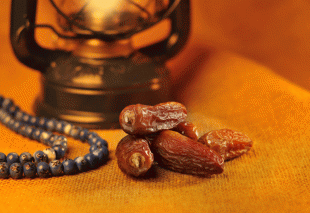

A nutritionist's guide to a healthy, happy Ramadan

The holy month of Ramadan can be a period when diets go haywire, but this doesn’t have to be the case.
Follow these top tips from nutritionists at Nestle to enjoy a healthy and balanced Ramadan.
article continues on next page...
Keep hydrated
When it comes to fasting, especially in the hot summer months, fluid replenishment should be your first priority. Your number one choice for hydration should be water – it is free of calories and the only fluid that quenches the body in a healthy way. Aim to drink at least eight glasses of water after Iftar and throughout the night to ensure proper hydration and to avoid dehydration symptoms. Other food items that also contribute to fluid intake are soup, juice, yogurt and coffee, in moderation.
article continues on next page...
Coffee fix
When coffee is consumed in moderation (3-4 cups a day), it can actually contribute to your fluid intake! In fact, 1 cup of coffee contains approximately 150 ml of water. The recommendation however remains to drink 8 glasses of pure water daily.
At Iftar you can have your cup of regular coffee two hours after you complete your Iftar meal. This way you would have allowed plenty of time for your body to adjust its blood sugar level with a balanced Iftar. Coffee will also help keep you alert in case you feel sleepy after your meal.
If you enjoy the taste of coffee late at night, try a decaffeinated cup before you sleep.
If you wake up for Suhour just before the Athan (call to prayer), you can enjoy a cup of regular coffee along with your balanced meal. This will help you stay alert throughout your long day of fasting.
article continues on next page...
Balanced Meals
“Planning nutritionally balanced Iftar and Suhour meals will help you maintain a healthy weight during the Holy month. For instance, Iftar typically fulfills more than 55% of the body’s nutrition needs and balances the sugar levels in the blood and brain. While on the other hand, Suhour prepares the body for a long day of fasting according to Nestle Nutritionist Zeinab Maktabi.
It is recommended to have your Iftar over two phases: start with dates, soup and salad, then have your main course.
article continues on next page...
Iftar
Break your fast with a date as dates balance the blood sugar levels and contain beneficial minerals and fibre. Remember moderation, have up to three dates and don’t overeat.
article continues on next page...
Soup
Begin with a soup - they are warm and easy on the stomach and provide the body with some fluids and minerals.
article continues on next page...
Salads
Include salads at every Iftar – fresh vegetables contain fibres which are an essential part of the diet during Ramadan to avoid constipation and maintain a healthy digestive system. Be creative! Prepare salads which are rich in vegetables of different colours. The more colour the more beneficial vitamins and minerals in the salad.
article continues on next page...
Fried foods
Avoid fried items - Instead prepare baked pastries or steamed vegetables.
article continues on next page...
The right balance
Balance your plate - Fill one fourth with carbohydrates, one fourth with proteins, and the remaining half with veggies. This way you can fulfill all your nutritional needs in a balanced and healthy way.
article continues on next page...
Deserts
Desserts in moderation - With each Iftar, serve only one dessert and keep your portion of sweets to not more than three fingers in size. You can have fresh or dried fruits and nuts instead of dessert to satisfy any sweet cravings.